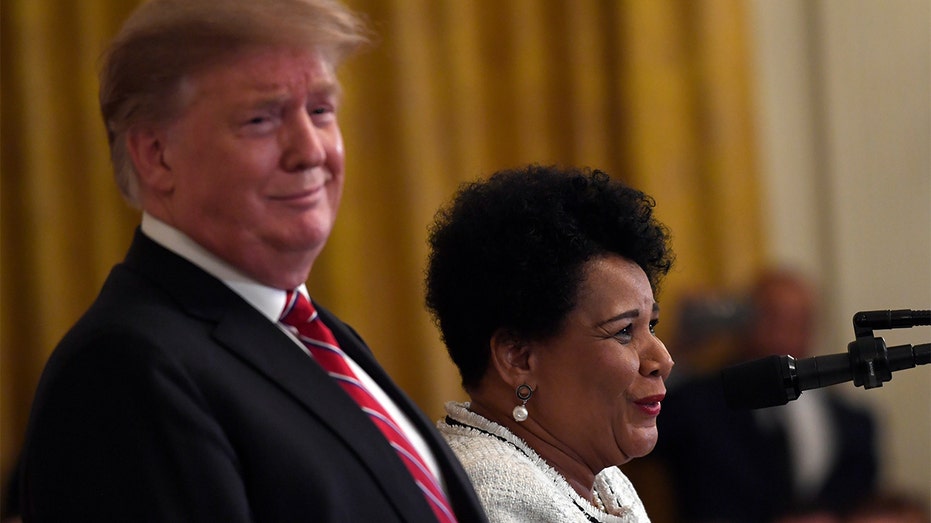Trump defied the odds to win a criminal justice victory in his first term. Could he do it again?
Trump made his mark during his first term with criminal justice reform. He helped lower recidivism and aided inmates who got their lives together. He can take that to the next level.

In the fall of 2018, I stood in the White House as President Donald Trump endorsed the First Step Act, a bipartisan bill aimed at reforming federal sentencing and modernizing our outdated prison system. As a lifelong Democrat and human rights attorney, I never imagined working with Trump on this cause. But I knew the stakes: my family, like millions of others, had been devastated by our justice system’s harsh sentencing laws and lack of rehabilitative opportunities — policies that trap countless Americans in cycles of poverty, crime and despair.
Later that year, surrounded by members of Congress, law enforcement leaders and advocates, Trump signed the First Step Act into law, delivering long-overdue reforms that both political parties had failed to achieve at the federal level for decades. It was a landmark moment, driven by a president who kept his promise to fight for the "forgotten men and women" of this country.
The results speak for themselves. Individuals released under the First Step Act have a recidivism rate of just 9.7% — just a fraction of the national average of 50-80%. It has been the ultimate tough-on-crime solution: fewer victims, safer neighborhoods and countless lives restored.
DEPRESSION COULD BE PREVENTED WITH SPECIFIC DAILY STEP COUNT, STUDY FINDS
Now, as Trump returns to the White House, he has a historic opportunity to finish what he started. Two key reforms he could champion — modernizing federal supervision and expanding second chances — offer a chance to cement his legacy as the leader who transformed America's approach to justice.
Consider Daniel Lynn Brown, who was released under the First Step Act after serving 15 years in federal prison for drug offenses. When Brown came home in 2020, he was placed on 10 years of federal supervised release. Since then, he has transformed his life. He started his own business and works full-time as a construction project manager, is a pastor, owns two homes and provides for his five children.
Yet outdated supervision rules hold him back. He can’t travel without permission from his probation officer, forcing him to turn down career opportunities, including a dream job helping others reintegrate into society. Despite his spotless record, Brown must endure six more years of supervision, with constant check-ins, random drug tests and continued barriers that disrupt his work and family life.
Federal supervised release, originally designed to help higher-risk individuals reintegrate after prison, has become a bloated, ineffective bureaucracy. Supervision is now applied in nearly every federal case, ensnaring tens of thousands who pose no real threat to public safety.
Too many are sent back to prison for technical violations — like missing a meeting or crossing a county line — wasting taxpayer dollars and destroying lives. Meanwhile, probation officer caseloads can exceed 100 cases per officer — about 50% higher than recommended — while they struggle to monitor individuals who genuinely pose a threat.
Imagine devoting resources to supervise people like Brown, or grandmothers like Alice Marie Johnson, while higher-risk individuals slip through the cracks — a situation that has too often led to tragedy.
The bipartisan Safer Supervision Act would fix this. By focusing resources on high-risk cases, modernizing supervision practices and reducing unnecessary reincarceration, this legislation builds on the evidence-based principles that delivered public safety benefits in the First Step Act and more than a dozen states.
CLICK HERE FOR MORE FOX NEWS OPINION
It already has support from a diverse coalition of law enforcement leaders, reentry providers, employers, faith groups and others who once united to pass the First Step Act and are ready to fight again.
But supervision reform is just one piece of the puzzle. Employment is one of the surest ways to prevent reoffending, yet millions of Americans with criminal records remain locked out of the workforce due to outdated policies and stigma. Meanwhile, industries like manufacturing and construction face severe labor shortages.
Trump recognized this challenge during his first term, implementing the Fair Chance Hiring Act, increasing federal bonding programs, and re-launching the Federal Interagency Crime Prevention and Improving Reentry Council. "When we say ‘hire American,’ we mean all Americans," he famously said, pledging to cut the unemployment rate for individuals with criminal records — which is five times the national average — down to single digits.
In his second term, he can supercharge these efforts and build on these successes. He can continue to expand federal second chance hiring programs, remove unnecessary licensing or regulatory barriers and incentivize employers to hire formerly incarcerated people, ensuring that once individuals are no longer locked up, no American is locked out of our workforce. These reforms would not only reduce recidivism but also help address the labor shortages holding back the economy.
Trump once defied the odds and expectations to deliver reforms that made us safer and stronger. Now, as he begins his second term, he has the chance to cement his legacy as a leader who didn’t just talk about being tough on crime but proved it with results. By modernizing supervision, expanding second-chance hiring and building on the First Step Act’s success, he can make America safer, stronger and more just for everyone.


